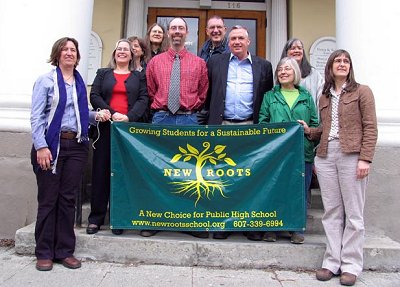- By Dan Veaner
- Around Town
 Print
Print  When the school year begins next Fall a new Tompkins County high school will open its doors. The New Roots Charter School will serve students from around the county and beyond. In its first year the school will include a ninth and tenth grade class. Eleventh grade will be added in 2010 and twelfth in its third year.
When the school year begins next Fall a new Tompkins County high school will open its doors. The New Roots Charter School will serve students from around the county and beyond. In its first year the school will include a ninth and tenth grade class. Eleventh grade will be added in 2010 and twelfth in its third year."It's a small school," explains Executive Secretary Melissa Mueller. "We'll end up as a ninth through twelfth grade high school. Our full enrollment will be 225 students. In this starting year our target enrollment is 125."
Despite opposition from residents who are concerned that the new school will funnel money away from local schools in an economic environment in which they are already making cuts, the school had 82 applications by April 1st. While money does follow students out of their local schools, Mueller says that the school is good for the community.
"This project is bringing in money from outside of the local area," she notes. "We've hired a staff and we'll be hiring more. We're creating jobs in Tompkins County, so in a way it's a good time to start. We have a smaller teacher to student ratio than other schools, so there will be more teachers per student. In this volatile economy it's the people who have the least who are the most vulnerable. This school is open to everyone."
 (Left to right) Executive Secretary Melissa Mueller, Principal Tina Nilsen-Hodges, Board of Trustees Secretary Kathryn Caldwell, parent volunteer Julia Morgan, Board of Trustees Chair Jason Hamilton, Board of Trustees Treasurer Granger Macy, Board of Trustees member Peter Bardaglio, Board of Trustees member Synnove Heggoy, Parent Volunteer Aileen Fitzke, Business Manager Sabrina Johnston. Photo by Jim Bosjolie. |
Charter schools receive state and federal funding. The majority of the schools' budget comes from local property tax money that follows the student from their home school district. In Lansing that means the district pays $12,850 for each Lansing School District student that attends the New Roots School. As of this writing four Lansing students have enrolled for next year. Local groups have aligned with or against the school. While school districts may allow charter school students to participate in sports, the Ithaca Board of Education voted not to allow it. Some individuals mounted an opposition on the grounds that the school would leach money from their local school budgets.
But the school boasts support from countless individuals and businesses, and a mailing list of more than 1,000 supporters. Mueller says New Roots will serve students who aren't being well served in their current schools, kids who she says are 'slipping through the cracks.' The school will offer a smaller teacher to student ratio than other schools, meaning smaller class sizes and more individualized attention. Mueller says that several home school parents are enthusiastic with some volunteering to be involved in the school.
New Roots must be open to all New York students, because it is chartered through the State University of New York, but realistically most students will come from Tompkins and Cortland counties. With the dour economy it will provide a cost-free option for families that can not afford private school tuitions. "Especially in these economic times, that's important," she says.
The school is renting space in the Women's Community Building, which will largely house administrative offices, and in Clinton House, which will house classrooms. The curriculum will be hands on with students spending a significant amount of time outside of the classroom working in the community and on field trips. A 'Farm To School' program is planned to provide food served in the lunchroom and an out-of-classroom experience for students.
The school Web site explains, "Traditional learning will dovetail with a 'whole earth approach' to motivate students to use their education to make concrete changes in their communities." Social Studies classes will emphasize how social dimensions influence bioregions. English classes will use literature as a way of studying social justice. Earth science will focus on the planet as an integrated system including earth science, chemistry, physics, biology, mathematics and technology. Some classes will offer college credit.
"We have incredible resources within the community," Mueller says. "The potential for our students to connect with those resources is really amazing. We have the public library. We are developing partnerships with TC3, Ithaca College, and Cornell."
Principal Tina Nilsen-Hodges and her staff are currently hiring faculty for the first school year, involving students in the hiring process and emphasizing cross-disciplinary teaching. Nilsen-Hodges has been a teacher and curriculum developer focusing on innovative educational programs for democracy, social justice and sustainability education. She has taught at the Elizabeth Ann Clune Montessori School of Ithaca, Binghamton University's Educational Opportunity Program, and Ithaca College, and has been a leader at Ithaca's Eco Village. She completed her administrartive internship in 2007, and is working on her New York State School Building Leader certificate at Massachusetts College of Liberal Arts. She holds masters degrees in teaching and English, and is certified as a pre-K through grade 12 teacher.
"President Obama has advanced an agenda of sustainability and he's coming up against economic realities," Mueller says. "We, like him, believe that the way out of this economic crisis is through things like green technology and reducing our consumption -- really changing the way we live. That is what this school is going to teach. We'll be teaching the kids how to be on the cutting edge of the sustainability revolution."
----
v5i20



